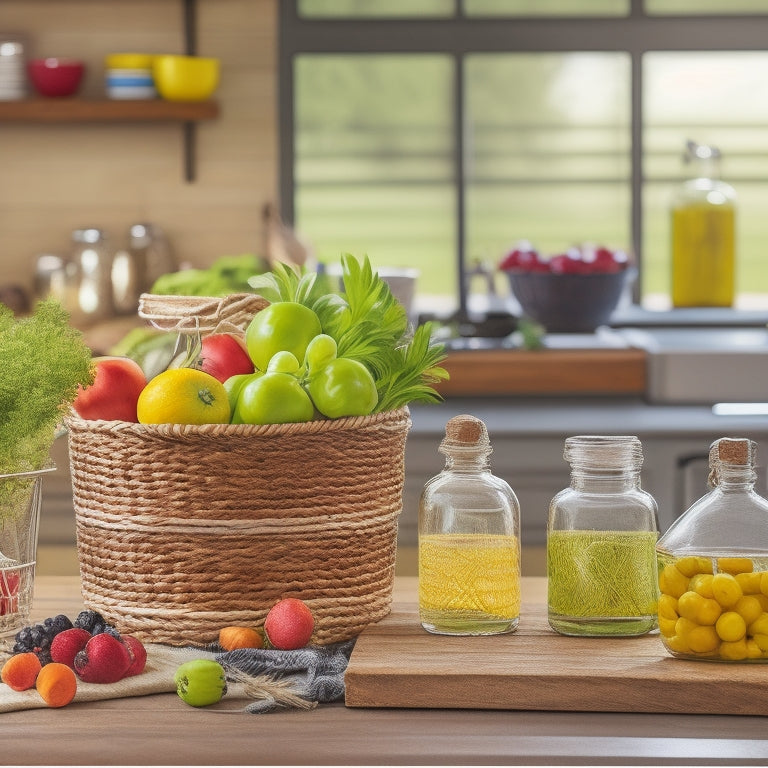
Easy Tips for Fresh Food Storage
Share
To keep your fresh produce fresh for longer, start by freezing fruits like blueberries and strawberries, which preserve flavor and nutritional value when frozen. Store vegetables according to their specific needs, such as lettuce in sealed containers and basil wrapped in damp paper towels. In your pantry, organize items by category, store them in a way that minimizes moisture and airflow, and use airtight containers to extend shelf life. By implementing these simple techniques, you'll be well on your way to enjoying your favorite foods year-round and discovering even more secrets to ideal food storage.
Key Takeaways
• Freeze fresh fruits like blueberries and strawberries to preserve flavor and nutritional value, and enjoy them year-round.
• Store vegetables in breathable bags or containers to prevent moisture buildup and maintain freshness.
• Use airtight containers to extend shelf life and minimize moisture and airflow in food storage.
• Regularly check stored vegetables for spoilage and remove them promptly to maintain freshness.
• Organize pantry items by category and wrap items tightly in plastic wrap or aluminum foil for easy access and preservation.
Freezing Fresh Fruits
When it comes to preserving the flavor and nutritional value of fresh fruits, freezing is an excellent option. It allows you to savor seasonal produce year-round. Blueberries and strawberries are two popular fruits that freeze exceptionally well.
To freeze blueberries, simply rinse and pat them dry before spreading them on a baking sheet and transferring them to a freezer bag. Strawberries require hulling before freezing. Freezing bananas is also a great way to maintain them for smoothies and baked goods.
Preserving berries through freezing guarantees they retain their nutritional value and flavor. By following these simple steps, you can enjoy your favorite fruits throughout the year while sustaining their freshness and nutritional benefits.
Storing Vegetables Fresh
While freezing is an excellent way to preserve fruits, storing vegetables fresh requires a different approach to maintain their texture, flavor, and nutritional value. To keep vegetables fresh, it's essential to understand the specific storage needs of each type.
For example, leafy greens like lettuce should be stored in a sealed container with a paper towel to absorb excess moisture, while preserving herbs like basil can be done by wrapping them in a damp paper towel and storing them in a plastic bag.
- Keep vegetables away from strong-smelling foods, as they can absorb odors easily.
- Store vegetables in breathable bags or containers to prevent moisture buildup.
- Check on stored vegetables regularly to remove any that are spoiling, as they can affect the freshness of others.
Smart Storage Techniques
Beyond the basics of storing vegetables fresh, employing smart storage techniques can greatly extend the shelf life of your produce.
One key strategy is pantry organization, where categorizing and grouping similar items facilitates easy access and reduces clutter. This, in turn, enables effective food preservation and meal prep.
Another kitchen hack is to store food in a way that minimizes moisture and airflow, such as using airtight containers or wrapping items tightly in plastic wrap or aluminum foil.
Frequently Asked Questions
Can I Store Fresh Herbs Like Basil and Cilantro in the Same Way as Green Onions?
When storing fresh herbs like basil and cilantro, avoid the green onion method. Instead, try Herb Clustering, where stems are tied together, or Leaf Folding, where leaves are gently folded to prevent bruising, and store in a cool, dry place to maintain freshness.
Are There Any Fruits That Should Not Be Washed Before Storing?
When storing fruits, Berry Precautions dictate that delicate berries like strawberries and raspberries should not be washed beforehand to prevent mold and spoilage, while Citrus Exceptions, such as oranges and lemons, can be washed and dried before storage.
Can I Use the Same Storage Methods for Organic and Non-Organic Produce?
'When we explore the world of produce storage, an important question arises: can storage methods be universally applied to both organic and non-organic produce? The answer lies in the nuances of pesticide impact and soil quality, which require customized approaches to guarantee maximum freshness and safety.'
How Long Does It Take for Stored Fruits and Vegetables to Go Bad?
When stored properly, the shelf life of fruits and vegetables varies, with most lasting 3-7 days. Be aware that expiration dates are estimates, and spoilage can occur sooner if not stored correctly, posing food safety risks.
Can I Store Fruits and Vegetables Together in the Same Container?
Carefully crafting container logistics is essential for food safety. Generally, it's not recommended to store fruits and vegetables together in the same container, as different items have unique storage requirements and ethylene-producing fruits can hasten spoilage.
Related Posts
-

Boost Productivity With Free Google Sheets Templates
You can enhance your productivity exponentially by utilizing free Google Sheets templates, which offer a proven way t...
